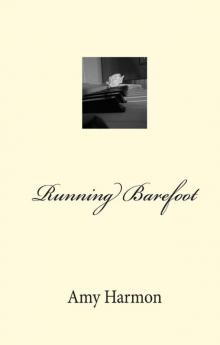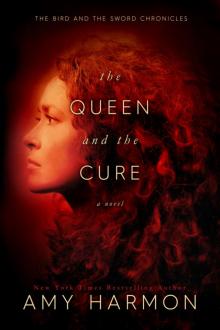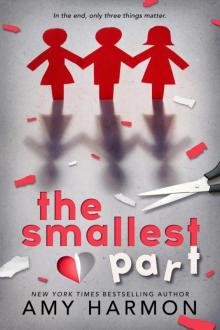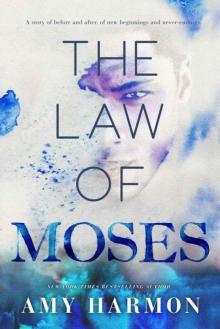- Home
- Amy Harmon
The Smallest Part Page 4
The Smallest Part Read online
Page 4
“Remember when you left for boot camp?” Mercedes asked, shaking him out of his private thoughts. She stepped back to view her handiwork, and something flickered in her eyes when she met his gaze. They both swiftly looked away.
“I remember.”
“Well, this course is boot camp for me. I’m not looking forward to it, but I’m committed. Thankfully, it’s only six weeks instead of nine, and there will be no running and weapons involved. I will also be able to call you every day—no letters required—okay?”
Noah saluted her, and she scooped pomade into her hands, rubbed them together, and styled his hair with the confidence and comfort of long companionship. Funny, he hadn’t thought about boot camp—or the day he left—in forever.
He and Mercedes had never talked about that kiss. It was the only time he’d ever kissed her, the only time she’d acted like she wanted him to kiss her, the only time she gave him hope. It was the kiss that came before Cora. Before he’d made a choice. Before Mercedes made the choice for him.
Mercedes wrote to him at boot camp, like she promised she would. But she didn’t ever mention the way they said goodbye, and how right that kiss felt. How good it was. How perfect. Mer, in her letters, was the same girl he knew at ten. The girl he knew at twelve and fourteen and sixteen. The girl who was as much a part of him as the palms of his hands or the heart in his chest. Something changed between them that night, no doubt about it. But Mer had hesitated. She’d turned back. She stepped away from the edge, and Noah didn’t want to fall in love by himself. So he climbed, hand over hand, back to the way things were before, and joined her on familiar ground.
Cora wrote to him too, long, lovely letters about philosophical things, and Noah discovered that he adored Cora on paper. He’d never been able to talk to Cora like he talked to Mercedes, but when she wrote, another woman emerged, and he saw her in a whole new light. Cora was a chameleon—colorful and quiet—becoming the girl she needed to be when the curtain rose. She wasn’t false; to say so would have been an injustice. She was adaptable and amenable. Sweet. Smart. And she wrote beautiful letters. She was convinced she loved him. He saw it in the curling words and the flowing phrases that filled her pages, and he began to feel things he hadn’t felt before.
He fell in love with Cora when they were apart.
Oddly enough, when he was deployed to Afghanistan ten years later, after six years of marriage, the phenomenon did not repeat itself. Mercedes was as constant as always. She sent chatty letters that made him laugh and packages filled with treats and silly gifts to pass the time—a joke book with the stupidest jokes ever written, boxes of trivia questions, a yo-yo, card games, and fake dog poop. He hadn’t had a yo-yo in years, but Mer reminded him that he’d been playing with one the day they met. Her letters were light and unchanging. The same Mer. His buddy. His pal.
Cora rarely wrote, and when she did, Noah didn’t recognize his wife. They weren’t letters from the girl who’d once captured him with her words.
Special arrangements were made for them to Skype right after Gia was born. Mer and Heather were there with Cora, who smiled weakly and asked Mer to hold Gia up to the camera so he could get a better look at his tiny, newborn daughter with her pink skin, downy fuzz, and fat cheeks. Gia’s cheeks were bigger than her whole head, and he’d laughed and cried, feeling the awe and the responsibility that fatherhood brings. He told Cora he loved her, and he’d meant it, convinced Gia would be the new start they needed. She said she loved him too, but he could tell something was wrong, and he felt it, even half a world away. He blamed it on distance and the trials of giving birth alone during a long deployment. They weren’t the first couple to go through it. They wouldn’t be the last.
He was home again two months after Gia was born, but Cora was struggling, and he didn’t know how to help her. She cried often and slept rarely. Her milk was plentiful, and Gia was content, but his wife was troubled. He asked a colleague—Dr. June from Montlake—to see her, thinking it would be easier for Cora to take advice and receive care from someone other than him, and Dr. June prescribed a mild anti-depressant. Cora was convinced it would be bad for Gia and refused to take it. Noah suggested a mother’s health was key to a child’s health, and that breast milk was important, but formula would do just fine if it meant Cora felt better.
“You’re a psychologist, not a pediatrician, Noah. You don’t have a medical degree. What do you know about it?” Her tone was weary, not angry, and he didn’t push it. Maybe he should have said he knew a lot about it. He’d had a mother who was clinically depressed, who suffered from debilitating anxiety, who rarely left the house in the daylight, and who died in her sleep a week after he turned nineteen. But hey, what did he know?
He sighed, rubbing his hands over his face, and watched Mercedes sweep up his hair clippings and tidy the kitchen. Mer never stopped moving, never stopped doing, and he wanted to beg her to stay, to cancel her trip, so he didn’t have to be alone. He was so damn lonely. So damn tired.
He rose and carefully removed the tray from Gia’s high chair. He needed to change her pants and put her pajamas on. It was bedtime—or close enough—but he was afraid he would wake her and be unable to get her back to sleep.
He unlatched the little seatbelt that kept her from slipping out of her chair and eased her up into his arms. Her diaper felt dry and maybe pajamas weren’t that important. A few golden clumps of hair were stuck to her back, and he felt a flash of panic. It was her first haircut. Was he supposed to save her hair? Didn’t some parents do that? And where did he put hair clippings if he saved them? Oh God, was he supposed to make a baby book?
“Feed, clothe, comfort,” he chanted softly. “Stick to the basics, let the other shit go.”
“Words to live by,” Mercedes said, drying her hands. She brushed a kiss on Gia’s soft head and, standing on her tiptoes to reach his scruffy face, pressed a sisterly kiss on his cheek.
“If you need me, I will come home. You know that, right?”
“I know that.” But he wouldn’t ever ask her to come home.
“I love you, Noah,” she said quietly.
“I love you too.”
“It won’t always hurt like this, will it?”
“You know the answer to that, Mer. We both do.”
“Yeah. I guess we do.”
She kissed his cheek again and let herself out. Noah climbed the stairs, put Gia in her crib, covered her gently, and tiptoed out. He showered quickly and fell across his bed, exhausted. But he didn’t sleep. Like he’d done every night since Cora died, he pulled a blanket and a pillow from his bed and slept on the floor near Gia’s crib, afraid he would sleep so hard he wouldn’t hear her, afraid she would cry and no one would come.
***
Three
1986
“What are you making?” Mercedes asked.
“Paper dolls,” Cora answered.
Mercedes watched as Cora folded the paper and snipped away, cutting a little here, a little there. Then, her tongue sticking out between pink lips, she pulled the paper apart. Cora held a row of paper people—hands joined, feet touching—between her fingers.
“Now you color them, so they don’t all look the same.” She reached behind her. “I made this one earlier. I messed up and accidentally cut too deep, so this one only has three instead of six. But I liked it. It’s us, see?”
She’d given the middle figure short brown curls and blue eyes.
“Is that Noah?”
“Yes. And that’s you and me.” The figure on Noah’s left had long red hair, the figure on his right, tan skin and black braids. She’d given them all radiant smiles and colorful clothes. Mercedes recognized the striped red shirt and the jean skirt she’d worn on the first day of school. Noah was wearing the Karl Malone jersey he got for his birthday, and Cora’s paper doll was colored entirely in purple—one of the colors of the Utah Jazz—indicating her new obsession. Noah liked Jazz basketball, so Cora did too. Mercedes pretended she liked the
Lakers, just to be contrary, but she had a poster of the Jazz point guard, John Stockton, on the inside of her closet door. Her favorite number was 12, like the number on his jersey. John Stockton was the little guy on the floor. He handled the ball and made everyone else look good. Mercedes liked that.
“What do you think?” Cora said, dangling the paper trio in front of her.
“Cute.” Mercedes still played with her Barbie dolls when she was alone. Twelve was a little too old for play-acting, but she liked to dress them and experiment with their hair. Paper dolls would be fun to decorate.
“You can have these. There’s six of them, just like your family,” Cora offered.
Abuela, Mami, Papi, Mercedes, and her two older cousins, Jose and Angel, did indeed make six. Tia Luisa had gone back to Mexico, and Mercedes had big news. “Jose and Angel are moving out. I won’t have to share a room with Abuela anymore. I will have my own room. Just like you and Noah.”
“That’s easy to fix.” Cora promptly cut two figures off the end of the row of dolls, making a family of four, and the detached figures fluttered to the ground.
“Adiós, Angel and Jose,” Mercedes said. She and Cora laughed, and Mercedes began to decorate her paper family with Cora’s markers. Cora retrieved the severed couple—Angel and Jose—from the floor. She held it, studying the faceless figures.
“My dad wants to leave too,” she murmured. Slowly, she separated one paper doll from the other and watched as it fell. “Bye, Daddy.”
* * *
“Noah?”
The blinds were all closed, and the house was so dark Mercedes stood just inside the door, blindly feeling along the wall to locate the switch. Finding it, she flipped it and gasped as the living room was flooded with light. Noah had always been obnoxiously tidy, but the living room was a wreck. It smelled like sour milk, moldy takeout, and wet dog. Noah didn’t even have a dog. A small trashcan, overflowing with tightly wrapped diapers stood near the door as if Noah had intended to take it out and gotten distracted. A mountain of laundry that seemed to be clean but hadn’t been folded spilled from the couch. Mercedes walked slowly through the mess, flipping on lights and breathing through her mouth, her alarm growing with each step.
“Noah?” she called again, louder. His kitchen looked like a scene from that Bruce Willis movie where the kid sees dead people. Every cupboard was open but half-empty. Most of the dishes were in the sink and piled on the table. The refrigerator was ajar, emitting a tired light and a foul odor. A box of Raisin Bran spilled its contents across the counter, and a half-full carton of milk sat beside it, the cap missing. Something squished beneath her left shoe, and she did a shimmying side step to avoid the long row of ants surrounding the crushed banana skewered by her stiletto heel.
“Noah!” Mercedes hollered, more worried than angry, but a little pissed too. He should have called her. From the looks of the house, the last six weeks had not gone well. She balanced on one foot and freed her shoe from the gooey ant feast.
Her shoe restored, Mercedes climbed the stairs to the two small bedrooms, stomping so that if Noah was naked, he had plenty of time to pull on some pants.
The lamp by the bed was on, but they were asleep, Gia sprawled across Noah’s chest. Drool dribbled from her mouth and onto his white undershirt. He’d pulled a pink blanket over her back, and his arms cradled her, but they were out. Mercedes studied them for a moment, father and daughter, and felt a rush of tenderness and despair. For months he’d been juggling everything alone, and he’d obviously hit a wall. She felt bad for yelling when she’d entered the house. It had been so quiet—and so filthy—she’d overlooked the obvious. Mercedes backed out of the bedroom and softly shut the door behind her.
Mercedes kicked off her heels, dug through the pile of clean laundry in the living room and found a pair of Noah’s boxer shorts, one of his T-shirts, and a pair of socks, because walking around barefoot in the apartment in its current state gave her the heebie jeebies, and she wasn’t going to scrub floors in a pencil skirt. She flipped on the lights and got to work, making a grocery list as she went; the refrigerator was so empty it wasn’t hard to clean. It appeared Noah and Gia were living on mashed potatoes and baby food, and there wasn’t much else in the house. She scrubbed the bathroom, walls and all, taking off a little paint in the process, and added paint to her list. She’d give the bathroom a facelift when she had a minute.
Bug spray, toilet paper, trash bags, dish soap, laundry detergent, eggs, milk, cheese . . . the list kept growing. Three hours, three loads of laundry, and three garbage bags later, Mercedes had the place whipped into shape, and still silence from upstairs. She changed out of Noah’s clothes and donned her pencil skirt and heels once more, slipping out to make a much-needed trip to the grocery store.
She was unloading groceries into Noah’s clean refrigerator when she heard footsteps overhead, the sound of the bathroom door opening and closing, and the shower turning on. She finished putting her purchases away and started a pot of coffee. If Noah was up, she was going to run the vacuum. It would alert him that she was there if his clean bathroom hadn’t already clued him in.
Ten minutes later, he descended the stairs, and Mercedes called out to him.
“I’m in here, Noah, declaring war on the thousands of ants living in your kitchen.”
He walked in, wearing sweats and a grey, Jazz Basketball T-shirt. He opened the refrigerator, took stock of its contents, and removed the orange juice, pouring a glass and drinking it before rinsing it, drying it, and putting the glass back in the cupboard. That was the Noah she was used to. He moved to the kitchen table and sat down wearily.
“You’re back.”
“I am.”
“You didn’t have to do this,” he muttered.
“I did. The place was a mess, Noah.”
He nodded slowly, but he didn’t defend himself. His eyes were darkly rimmed, and his wet hair stood on end, like he’d run the towel over it and forgotten about it. She smoothed it down so it wouldn’t dry that way. He bowed his head beneath her hands, submissive.
“Are you growing out your hair?” It clearly hadn’t been cut since she saw him last. He always wore it in a severe crop and it was now curling over his forehead, reminding her of his boyhood days.
“No. Not on purpose. It’s just another thing I haven’t had time to do.”
“How are you?” she asked, needing to know, hoping he would tell her.
“I’m tired, Mer.” He was the only one in the whole world who called her Mer. Everyone else called her Mercedes or Sadie.
“Why haven’t you called me?” she asked quietly. She’d only been back for two days, but all the time she’d been gone, she hadn’t heard a word. He hadn’t answered her emails or returned her calls. She’d called Heather several times just to make sure everything was okay.
“And said what? Come home from LA and clean my house and buy me groceries? I’m a grown man with one small child. I’m handling it. Not always well, but I’m doing the best I can. Gia’s been sick, and it’s thrown the schedule off.”
“Sick how?”
“She got a cold. Then she got an ear infection. We went to Instacare yesterday and got some antibiotics. She should start feeling better soon. No fever today.”
“Why don’t you go back to bed? Gia’s asleep now. You should be too.”
“I have to go to work.”
“Tonight?” It was almost ten o’clock on a Sunday night.
“Mondays and Saturdays, I work days. On Saturdays, Heather takes Gia. Tuesdays and Thursdays, and every other Sunday, I work graves. Mrs. Greer comes over and sleeps here and takes Gia to Day Care in the morning when I work nights.”
“Mrs. Greer is a hundred years old,” Mercedes gasped.
“Eighty. And she’s raised four kids and two grandkids. All she has to do is get Gia up in the morning, change her diaper, dress her, and take her across the street to Sunnypatch. They feed Gia breakfast when she gets there. Mrs. Greer makes a l
ittle money, and she’s a sweet old lady.” He rubbed at his face. “I pick Gia up when I get home around 12:30 so she’s only there for four hours on Wednesdays and Fridays.”
“When do you sleep?”
“I sleep Monday, Wednesday, and Saturday nights.”
“Don’t forget every other Sunday.”
“Right.” He sighed.
“And Gia’s at Sunnycrap for twelve hours on Mondays—every Monday?”
“Eight. I get off at five on Mondays. Please don’t call it Sunnycrap. I feel guilty enough already.”
“The salon isn’t open on Mondays, Noah. You know that.”
He nodded wearily.
“So why the hell haven’t you asked me to watch Gia?”
“Because I knew you would say yes, and you have your own life.”
“I’m going to pretend you didn’t just say that to me.”
His eyebrows rose over his bloodshot, blue eyes. “Say what?”
“I loved her too, Noah. And I love you. You are part of my life. I want to help. I need to help.” She felt the tears that would never reach her eyes fill her throat. She cleared it, swallowing them back down. The silence swelled between them, the drip from the faucet, the hum of the refrigerator, the murmur of a passing car.
“It’s been three months,” he whispered.
“It feels like three years,” Mercedes answered.
The silence grew again, Cora filling the space around them and between them. She sat in an empty chair, watching them miss her. Mercedes shook her head, and Cora was gone.
“I don’t feel anything at all most of the time, Mer,” Noah confided. His voice was hollow, and it rattled around in her head. She waited for him to continue.
“I know all the stages of grief. I know the clinical terms and the right things to say. I know how to listen and advise. But I’m numb. I keep waiting to feel something. I’m supposed to help people—sad, suicidal, dangerous, depraved. But I’m struggling to remember their names. The last few months are a blur. I’ve always been great at the details . . . the little things . . . the stuff most people don’t see . . . I see those things. It’s made me a good therapist. A good doctor. But right now . . . it’s all a blur, and I’m not good at anything. I’m not a good husband.” He flinched, as if remembering that he wasn’t a husband at all anymore. “I’m not a good father. I’m not a good therapist. I’m a collection of parts.”

 Prom Night in Purgatory
Prom Night in Purgatory Running Barefoot
Running Barefoot The Queen and the Cure
The Queen and the Cure The Smallest Part
The Smallest Part The Bird and the Sword
The Bird and the Sword The Song of David
The Song of David Infinity + One
Infinity + One The Law of Moses
The Law of Moses A Different Blue
A Different Blue From Sand and Ash
From Sand and Ash What the Wind Knows
What the Wind Knows Slow Dance in Purgatory
Slow Dance in Purgatory Romance Through the Ages
Romance Through the Ages